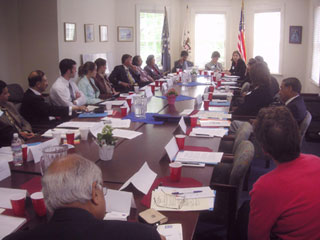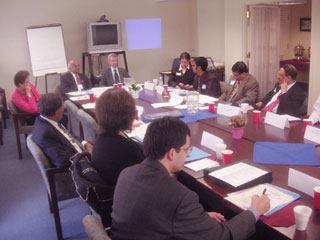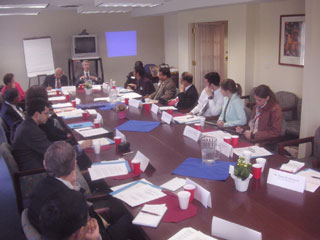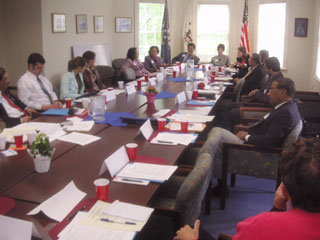All news
2006 Annual Conference on "Educational Seminar: Civic Participation"
The Association of Americans for Civic Responsibility (AACR) held its third annual Roundtable Conference on April 26, 2006 at the Maxwell School of Syracuse University at the Washington D.C. campus. Around 30 invited participants from various backgrounds gathered for a half-day long Educational Seminar on Civic Participation to discuss issues related to two major themes, namely "The American Immigrant Community and U.S. Immigrant Organizations" and "The Role of Small and Midsized Enterprises (SMEs) in Promoting Institutional Civic Responsibility (ICR)." The AACR conference was organized as a panel discussion with interactive participation. The moderators of the two panels were Professor Michael Schneider, director, Maxwell School of Syracuse University and Chad Tragakis, vice president, Hill & Knowlton, Washington D.C.
1st Discussion Panel: "The American Immigrant Community and U.S. Immigrant Organizations"
Moderator: Dr. Michael Schneider, Director, Maxwell School of Syracuse University, Washington D.C. program of International Relations (Chairman of AACR's Advisory Board)
After welcoming all participants, Professor Schneider opened up the conference with a brief history of Syracuse University's Maxwell School. He then introduced the topic of the first panel - Immigrant organizations and communities in the U.S. - and invited speakers to share their ideas and insights with the group.
Dr. Joy Cherian, president of AACR, also extended his warm welcome to all attendees.
Speakers:
Dr. Piyush C. Agrawal National Coordinator (U.S.A.), Global Organization of People of Indian Origin (GOPIO), Weston, Florida "The American Immigrant Community and U.S. Immigrant Organizations" (With Specific Reference to the Indian American Community)

Dr. Agrawal discussed immigration to the U.S., touching upon several issues including the historic perspective of immigration to the U.S., the current challenges facing immigrants and civic responsibility of immigrant organizations in the U.S. He specifically pointed out the civic participation of four major grassroots organizations in the Indian American community. He praised the role of these ethnic organizations for their commitment to America and for maintaining their cultural & ethnic heritage by promoting Global Civic Responsibility through giving back to their country of origin. Dr. Agrawal noted that these organizations are always looking forward to accomplish more and do more. As a result, AACR can play a significant role in "generating a Common Agenda for Action and identifying activities that may be conducted across as many ethnic immigrant community organizations as possible to make a real impact on a global scene." Dr. Agrawal then invited others to share their perspectives.
Mr. Francis Skrobiszewski of Booz Allen Hamilton and Mr. Ron Sturman of the Washington Times raised several thought-provoking questions related to the current congressional debate on the status of illegal immigrants. In the context of civic responsibility, Dr. Agrawal responded: "If we claim to be governed by the ethics of 'equality and justice for all' then why does it take more than five years for the spouses of legal migrants (green card holders) to come to this country and why are the petitions of H-1B visa holders not being processed within the stipulated time frame?"
Mr. Mahadeva (Matt) Mani Director, Strategic Markets, AT&T, Oakton, VA "Immigrants and Civic Responsibility" and "Corporate Social Responsibility and Diversity"
Mr. Mani addressed the idea of immigrants being likely to achieve success in the U.S. He noted that AACR's aim should be to actively engage immigrant communities in civic activities as those are the people who are best aware that achieving one's economic goals also requires investing in the community and society in which they live. Mr. Mani also presented compelling arguments for why companies should understand corporate social responsibility as an imperative. He gave an example of AT&T's commitment to CSR, highlighting the company's success in tapping on immigrant leadership through numerous civic initiatives.
Ms. Pavlina Majorosova Account Executive, Hill & Knowlton, Washington, DC "New immigrants and the American concept of volunteerism"

Ms. Majorosova underlined Mr. Mani's points by sharing her experience with American volunteerism as an immigrant from central Europe. She noted that U.S. culture is unique in the way it harnesses volunteerism and pointed out that the American understanding of civic responsibility often presents a new concept for immigrants coming from regimes with limited freedom and democracy. She emphasized that for this very reason, it is important that new Americans are encouraged and given opportunities to engage in civic activities through organizations like AACR. She suggested that this will help immigrants better understand American society, its values and ultimately fully benefit from living in a free and open society.
After the presentations, a lively discussion ensued. Ms. Violeta de la Peňa pointed out the inconsistency in government's actions toward various immigrant groups, giving an example of Filipino veterans who fought in World War II and who are still waiting to receive benefits they deserve for their loyalty and sacrifice to the country.
Ms. Jennifer Woofter of Strategic Sustainability Consulting noted that data shows that an overwhelming number of kids of successful immigrants become disillusioned. She raised the issue of how to ensure that values of civic responsibility adopted by the first generation of immigrants are also embraced by the subsequent generations. Ms. Vicki Hughes of the Bill of Rights Institute mentioned that the same can be observed even with American-born students. She stressed the importance of reaching out to youth and imparting to them the understanding of what it means to be an American - the principles on which the country was founded and the values and attitudes the country embraces.

Mr. Joseph Melookaran of JMA Chartered described how Kansas City established an annual tradition in which all schools hold an International Day. On this day, volunteers from diverse ethnic groups go to schools to speak about their own culture, reaching out to 30,000 students from different backgrounds and teaching them the significance of international understanding.
Dr. Patrick Mendis spoke of his experience with civic responsibility when he helped reach out across communities of different religious backgrounds to reconcile differences and bring about a common understanding.
Dr. K. P. Verghese, a practicing physician from St. Mary's County, Maryland, shared his experience with "giving back to your community" programs. As an immigrant from India and an American professional, he described how local professionals in St. Mary's county have helped people with disabilities in their own communities. He also mentioned his involvement with other Indian immigrants in the U.S. in helping aid patients in India.
Ms. Anne Brainard of the Center for Civic Education explained how her center is helping high school students to learn and practice civic responsibility programs.
Mr. Sombit Mishra of Global Giving outlined his organization's trans-national services for the benefit of underprivileged people in foreign countries.
Ms. Achamma Chandersekaran of Heritage Translation and Publishing pointed out the need for all Americans to get involved in voluntary services in their own communities.
The first session concluded with the unanimous opinion that AACR can play a vital role in guiding and coordinating various ethnic, professional, educational, business and governmental organizations in sensitizing them toward their civic responsibility.
2nd Discussion Panel: "The Role of Small and Midsized Enterprises (SMEs) in Promoting ICR"
Moderator: Mr. Chad Tragakis, Vice President, Hill & Knowlton, Washington, DC (AACR's Advisory Board member)
In his introduction, Mr. Tragakis noted that while corporations, particularly large multinationals, have been put under increased pressure to become socially responsible, society has not yet demanded the same from small and medium-sized companies. Mr. Tragakis called upon the speakers to present their perspectives on what role and responsibility small companies have.
Speakers:
Ms. Jennifer K. Woofter President, Strategic Sustainability Consulting, Washington, DC "Engaging SMEs in sustainable development"
Ms. Woofter shared her experience working with small and medium-sized companies to help them improve and increase their level of social and environmental responsibility. She stressed that SMEs are well positioned to fill the needs of local communities as they are best informed about local problems and issues. However, Ms. Woofter pointed out that SMEs often choose not to participate in social or environmental activities due to several challenges they face, including substantial set-up costs of the programs and also shortage of staff to learn about and implement practices leading to sustainable development. Ms. Woofter stressed that many of those challenges can be efficiently addressed by local partnerships between public/non-profit organizations and private small or midsized enterprises.
Hon. Joseph Melookaran President, JMA Chartered and President, International Relations Council, Kansas City, Kansas "Corporate Civic Responsibility and SMEs"

Mr. Melookaran drew on his longstanding experience with the SME community to share insights about corporate civic participation (CCR). He pointed out that though big corporations have the necessary resources and SMEs' resources may be limited, collectively, SMEs employ 80% of the workforce. He expressed his disappointment over the lack of commitment to CCR from SMEs based in the U.S. when compared to the commitments from their European and Latin American counterparts. He then outlined various incentives that might encourage SMEs to engage in CCR, including public recognition of those most committed. From his personal experience, Mr. Melookaran shared several examples of SMEs that have benefited by actively pursuing activities in CCR. He concluded that engaging SMEs in CCR in a comprehensive and coordinated way is "the largest untapped potential that will dramatically change the face of the communities."
Ms. Alysia M. Wilson Senior policy Advisor, ITA, U.S. Dept. of Commerce, Washington, DC "The U.S. government's involvement in promoting corporate social responsibility"
Ms. Wilson presented the government's perspective on the roles and responsibilities of the SME business community. She noted that the main focus of the U.S. Department of Commerce in this area is to help U.S. companies abroad increase transparency and fight corruption in local business environments. In terms of CSR, Ms. Wilson explained that several federal agencies have taken their own initiatives in this direction but that so far, there is no uniform plan of action. She stressed at present, the government's role in advancing corporate social responsibility is rather limited. She pointed out that one reason for that is the U.S. government's history of not overregulating business and thus the government's belief that CSR activities should be voluntary instead of regulated.
The broad array of issues covered in the presentations provoked a lively and fruitful discussion. Dr. Cherian, president of AACR, emphasized that all institutions are legal citizens and therefore should seek ways of how to give back to the society in which they have been incorporated and whose resources they draw upon to pursue their core missions. Ms. Anne Brainard of the Center for Civic Education commented on the importance of uniting corporate and public citizenship, encouraging local business leaders to visit schools and speak in front of students about building and sustaining local community. Mr. Ron Sturman of the Washington Times debated that CCR for SMEs, especially for those under financial stress, might not be an immediate goal to pursue. They may need to be first convinced that CCR is good for their corporate health. Dr. Patrick Mendis gave several examples of how CCR has benefited companies.
The second session ended once again with a strong agreement among participants that AACR has ample opportunities to serve as a clearinghouse for activities and training for civic responsibility to help SMEs find ways of giving back to their communities.
Keynote Speaker:
Ms. Tess Scannell Director, Senior Corps, Corporation for National and Community Service (CNCS), Washington, DC. "Baby Boomers and Volunteering"
In her keynote address, Ms. Scannell presented an overview of the Corporation for National and Community Service (CNCS) and gave a compelling presentation on what CNCS is doing to encourage baby boomers to volunteer. To help introduce the new campaign, she played a public service announcement aimed at boomers. Ms. Scannell pointed out that while they have different attitudes, goals and expectations than other generations, baby boomers are a tremendous resource of skills and experience from which society can benefit. She also noted that giving this generation opportunities for civic participation at their current workplaces (for example, allowing employees to take a few days off to volunteer) would substantially increase baby boomers' interest in community and other civic involvement when they retire.
Dr. Cherian concluded the conference by thanking everyone for participating in the discussions and especially, for sharing their experiences and insights that will help AACR define its role in the promotion of civic responsibility among immigrant groups and small and medium-sized enterprises.










